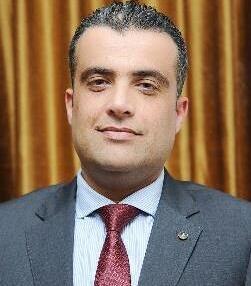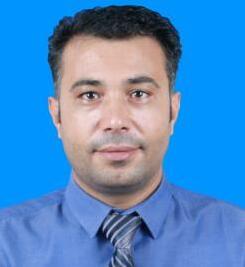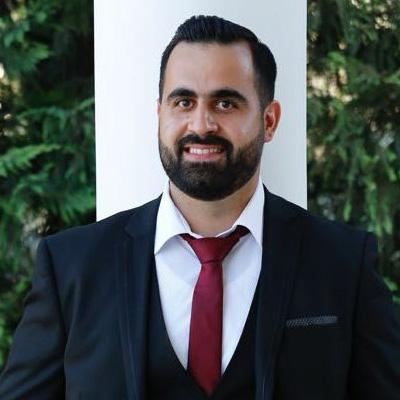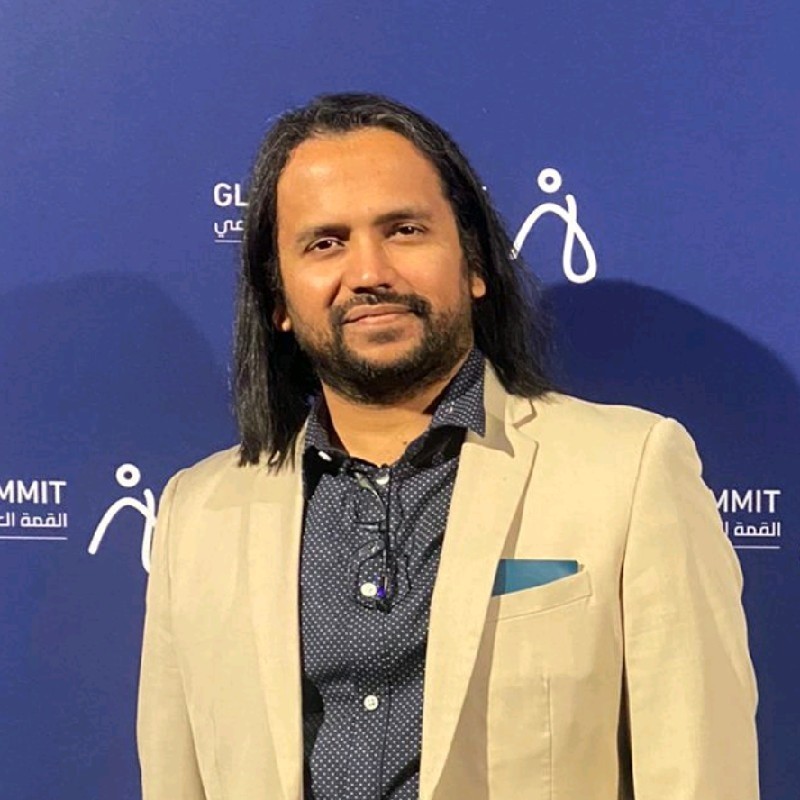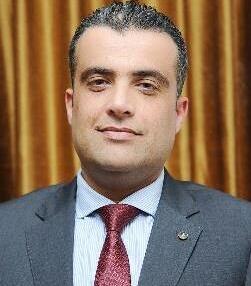
مرحباً بكم في قسم هندسة الطاقة المتجددة في جامعة الأمير فهد بن سلطان!
هنا، يلتقي الابتكار بالاستدامة لصياغة مستقبل الطاقة. عندما تنضمون إلى قسمنا، فإنكم تدخلون بيئة ديناميكية حيث تلتقي الأبحاث الرائدة، والتعلم العملي، والتطبيقات الواقعية لمواجهة أحد التحديات الأكثر إلحاحًا في عصرنا: الانتقال إلى الطاقة المتجددة.
بتوجيه من هيئة تدريس مرموقة ودعم من مرافق متطورة، يلتزم قسمنا برعاية الجيل القادم من قادة الطاقة المتجددة. سواء كنتم شغوفين بالطاقة الشمسية، أو الرياح، أو الطاقة المائية، أو التقنيات الناشئة، ستجدون أمامكم العديد من الفرص لاستكشاف وابتكار وتحقيق تأثير ذو معنى في هذا المجال.
د. عبدالله العلي
رئيس القسم وأستاذ مشارك
مقدمة
تأسس قسم الطاقة المتجددة في عام 2019 استجابة مباشرة للأهداف الطموحة لرؤية السعودية 2030 في التنوع الاقتصادي والاستدامة. ومع الاعتراف بالدور الحاسم الذي تلعبه الطاقة المتجددة في تحقيق هذه الأهداف، يلتزم القسم بتخريج جيل جديد من المهندسين المجهزين لقيادة التحول نحو الطاقة الخضراء في المملكة.
مع تحديد رؤية 2030 هدفًا لتحقيق 50% من الطاقة المتجددة بحلول عام 2030، تم تصميم برنامجنا لإنتاج خريجين يمتلكون المعرفة والمهارات والخبرة التكنولوجية اللازمة لدفع هذا التحول. نحن نوفر أساسًا شاملاً في مبادئ وتقنيات وتطبيقات الطاقة المتجددة، مما يمكن مهندسينا من المساهمة في تنمية البلاد، وتلبية احتياجات سوق العمل المتطورة، وتحقيق رؤية المملكة لمستقبل مستدام.
الرسالة
تسعى كلية الهندسة إلى تخريج مهندسين مختصين في الطاقة المتجددة قادرين على تلبية احتياجات السوق، مزودين بالمعرفة الأساسية والبحثية والمهارات اللازمة ليكونوا روادًا في المساهمة في خطط التنمية المستدامة الوطنية الشاملة. يهدف البرنامج إلى تزويد الطلاب بالقدرة على:
- المساهمة في خطط التنمية الوطنية المستدامة من خلال توفير حلول مبتكرة ومستدامة في مجال الطاقة المتجددة.
- توظيف المهارات الهندسية والمعرفة في تصميم وبناء وتشغيل مشاريع الطاقة المتجددة.
- دعم جهود المملكة في إدخال الطاقة المتجددة ضمن مزيجها الطاقي بما يتماشى مع رؤية المملكة 2030.
- العمل في بيئات متعددة، مع تبني التعلم المستمر، والتعاون، والقيادة في فرق متعددة التخصصات.
الأهداف التعليمية للبرنامج
يهدف برنامج هندسة الطاقة المتجددة إلى تحقيق الأهداف التالية:
-
PEO1.
سيقوم الخريجون بتصميم حلول عملية في مجال الطاقة المتجددة والاستدامة من خلال توظيف معارف هندسية واسعة وشاملة. -
PEO2.
سيقود الخريجون عمليات نشر وإدارة أنظمة الطاقة المتجددة بأمان وبشكل أخلاقي، ضمن سياقات اجتماعية-اقتصادية وبيئية متنوعة. -
PEO3.
سيتميّز الخريجون بالريادة ضمن فرق متعددة التخصصات، مع القدرة على التواصل بوضوح، وممارسة الحكم الأخلاقي، وإظهار الوعي العالمي. -
PEO4.
سيشارك الخريجون في البحث والابتكار، ويسعون إلى التعلم المستمر والنمو المهني للتكيّف مع التقنيات الناشئة..
مخرجات التعلم
A. ABET Student Learning Outcomes (SLOs) and their Performance Indicators (PIs)
|
Student Learning Outcome (SLO) |
Performance Indicator (PI) |
|
1) an ability to identify, formulate, and solve complex engineering problems by applying principles of engineering, science, and mathematics. |
1a- an ability to identify the principles of engineering, science, and mathematics. |
|
1b- an ability to formulate complex engineering problems based on the principles of engineering, science, and mathematics. |
|
|
1c- an ability to apply engineering, science, and mathematics principles to solve complex engineering problems. |
|
|
2) an ability to apply engineering design to produce solutions that meet specified needs with consideration of public health, safety, and welfare, as well as global, cultural, social, environmental, and economic factors. |
2a- an ability to produce a clear needs statement in a design project, identify design problem constraints, and establish criteria for solutions acceptability and desirability. |
|
2b- an ability to evaluate and analyze the economics of an engineering problem solution and to use appropriate analysis techniques to characterize and respond to risks in product or process design. |
|
|
3) an ability to communicate effectively with a range of audiences. |
3- an ability to communicate effectively with a range of audiences. |
|
4) an ability to recognize ethical and professional responsibilities in engineering situations and make informed judgments, which must consider the impact of engineering solutions in global, economic, environmental, and societal contexts. |
4a- an ability to recognize ethical and professional responsibilities in engineering situations. |
|
4b- an ability to evaluate alternative engineering solutions, which consider design conflict issues in economic, environmental, and societal contexts |
|
|
5) an ability to function effectively on a team whose members together provide leadership, create a collaborative and inclusive environment, establish goals, plan tasks, and meet objectives. |
5a- an ability to recognize participants roles in a team setting, fulfill appropriate roles to assure team success, integrate inputs from all team members, and make decisions in relation to objectives criteria. |
|
5b- an ability to monitor team progress and make suggestions accordingly. |
|
|
6) an ability to develop and conduct appropriate experimentation, analyze and interpret data, and use engineering judgment to draw conclusions. |
6a- an ability to show good lab practice and instrumentation skills to measure specific quantities and extract required data.
|
|
6b- an ability to use appropriate tools to analyze data and verify and validate experimental results, while accounting for experimental errors. |
|
|
7) an ability to acquire and apply new knowledge as needed, using appropriate learning strategies. |
7- an ability to express awareness of continuous learning and research, after graduation, and find information relevant to problem solutions without guidance. |
B. NCAAA Program learning Outcomes (PLOs)
|
NCAAA Program learning Outcomes (PLOs) (NQF) |
||
|
Knowledge and Understanding |
||
|
K1 |
Gain knowledge of mathematics, science, and engineering. |
|
|
K2 |
Outline engineering problems solutions based on the principles of physical sciences and mathematics. |
|
|
K3 |
Describe and categorize engineering related contemporary issues. |
|
|
Skills |
||
|
S1 |
Solve engineering problems by applying principles of mathematics, science, and engineering. |
|
|
S2 |
Develop and conduct appropriate experimentation, analyze and interpret data, and use engineering judgement to draw conclusions. |
|
|
S3 |
Apply modern techniques and skills to produce solutions in global, economic, environmental, and societal contexts for engineering practice. |
|
|
S4 |
Acquire and apply life-long learning skills as needed, using appropriate learning strategies. |
|
|
S5 |
Communicate effectively with a range of audiences. |
|
|
Values |
||
|
V1 |
Uphold ethical and professional responsibilities. |
|
|
V2 |
Function and contribute effectively in a team. |
|
C. ABET SLOs-NCAAA PLOs Mapping
|
PIs of ABET (1)-(7) |
1a |
1b |
1c |
2a |
2b |
3 |
4a |
4b |
5a |
5b |
6a |
6b |
7 |
|
NCAAA PLOs |
K1 |
K2 |
S1 |
S3 |
S3 |
S5 |
V1 |
K3 |
V2 |
V2 |
S2 |
S2 |
S4 |
D. POs-NCAAA PLOs Mapping
|
POs |
NCAAA PLOs |
|
I. Apply Engineering Fundamentals: Equip students to solve renewable energy engineering problems using principles of mathematics, basic sciences, and engineering analysis, aligned with industry and societal needs. |
(K1, K2, S1) |
|
II. Design Sustainable Solutions: Develop skills to design systems and processes that prioritize safety, sustainability, and ethical considerations in diverse socio-economic and environmental contexts. |
(S3, K3) |
|
III. Promote Professional Competence: Cultivate effective communication, teamwork, leadership, and ethical judgment to address global challenges and uphold professional responsibilities in engineering practice. |
(S5, V1, V2) |
|
IV. Advance Lifelong Learning: Prepare graduates to adapt to emerging technologies, conduct experiments, interpret data, and pursue continuous learning for research or professional growth. |
(S2, S4) |
E. POs-ABET SLOs Mapping
|
POs |
ABET SLOs |
|
PEO1. Graduates will engineer practical renewable-energy and sustainability solutions using broad-based engineering knowledge.
|
(1a, 1b, 1c) |
|
PEO2. Graduates will lead the safe, ethical deployment and management of renewable-energy systems across diverse socio-economic and environmental contexts. |
(2a, 2b, 4b) |
|
PEO3. Graduates will lead in multidisciplinary teams, communicating clearly, exercising ethical judgment, and demonstrating global awareness. |
(3, 4a, 5a, 5b) |
|
PEO4. Graduates will engage in research and innovation, and pursue continuous learning and professional growth to adapt to emerging technologies. |
(6a, 6b, 7) |
المناهج وهيكل البرنامج
للتخرج بدرجة البكالوريوس في هندسة الطاقة المتجددة ، يجب على الطلاب إكمال 159 ساعة معتمدة بشكل مرض. يتم توزيع الدورات على النحو التالي:
متطلبات الجامعة
ما مجموعه 37 ساعة معتمدة من متطلبات التعليم العام:
- 6 ساعات معتمدة للغة العربية: ARAB 101 و 201.
- 15 ساعات معتمدة من مهارات الاتصال باللغة الإنجليزية: ENGL 100 ,101,102,203, 206.
- 7 وحدات للدراسات الاجتماعية والثقافية: SOCS 101 ، PHE 101 ، ودورة اختيارية مجانية.
- 3 وحدات لأساسيات الحوسبة للمهندسين: IT 101.
- 6 وحدات في الرياضيات: MATH 100 and STAT 100
متطلبات الكلية
يطلب من طلاب قسم هندسة الطاقة المتجددة إكمال ما مجموعه 42 ساعة معتمدة في متطلبات الكلية موزعة على النحو التالي:
- 11 ساعة معتمدة في العلوم: PHYS 101 ، PHYS 102 ، PHYS 103L ، CHEM 101 / 101L ؛
- 18 ساعة معتمدة في الرياضيات والإحصاء : MATH 101, MATH 102, MATH 201, MATH 202, MATH 215, and STAT 230 ؛
- 6 ساعات معتمدة في البرمجة الهندسية: CSC 101 and ELEE 230 ؛
- 3 ساعات معتمدة في الاقتصاد الهندسي: 300 COEN
- 1 ساعة معتمدة في أخلاقيات الهندسة: 401 COEN
- 1 ساعة معتمدة في الرسومات الهندسية: CIVE 205
متطلبات البرنامج
يجب على طلاب هندسة الطاقة المتجددة إكمال 82 ساعة معتمدة في متطلبات البرنامج بما في ذلك الدورات الأساسية الـ 70 التالية:
▪ MECH 225, MECH 230, MECH 342, ELEE 212, ELEE 242, ELEE 350, ELEE 360, ELEE 380,ELEE 480L, ELEE 245L, REE 260, REE 310, REE 320, REE 320L, REE 340, REE 350, REE 400, REE 420, REE 460, REE 420L, REE 460L, REE 470, REE 474, REE 480, REE487, REE 466, REE 498, REE 499,
بالإضافة إلى ذلك ، يجب أن يأخذ طلاب هندسة الطاقة المتجددة ثلاث دورات اختيارية من 12 ساعات معتمدة ، وتشمل الاختيارية المقبولة:
▪ REE 465, REE 471, REE 472, REE 475, REE 476, REE 477, REE 478, REE 479, REE 481, REE 482, REE 483, REE 485, REE 486, REE 473, REE 488.
Flow chart of the renewable energy engineering courses (Study plan 2019).
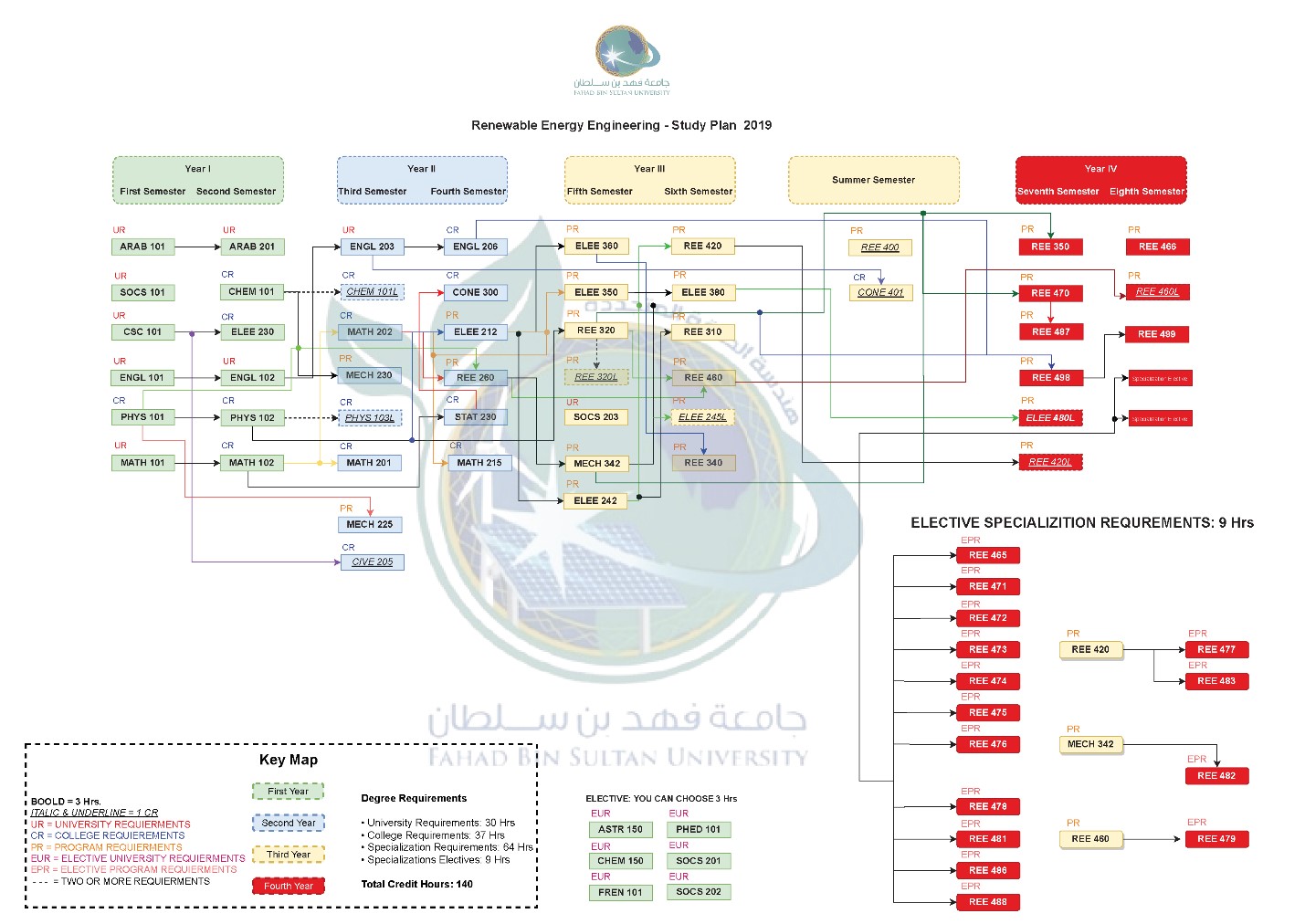
Flow chart of the renewable energy engineering courses (Study plan 2023).
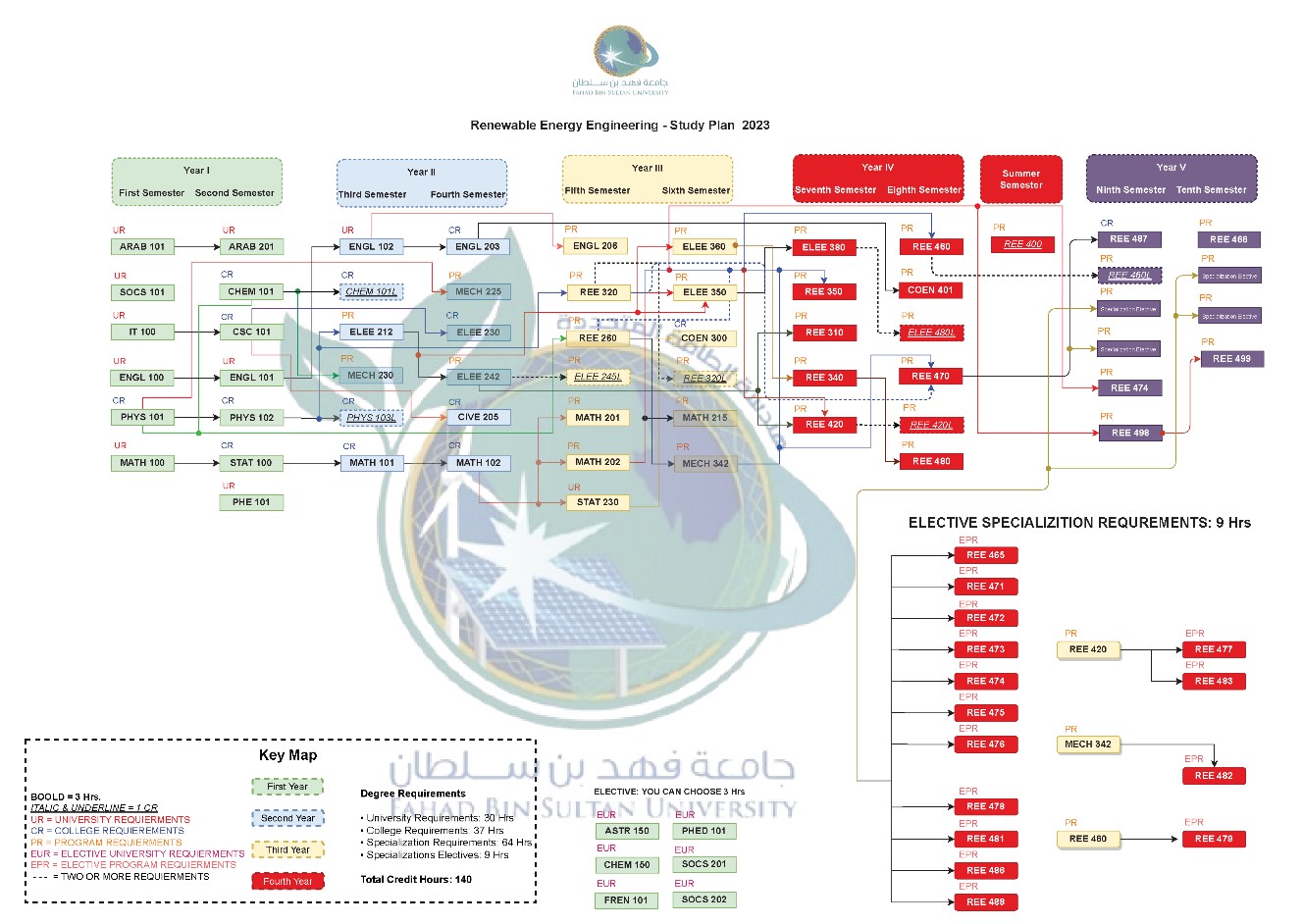
المناهج وهيكل البرنامج
للتخرج بدرجة البكالوريوس في هندسة الطاقة المتجددة ، يجب على الطلاب إكمال 159 ساعة معتمدة بشكل مرض. يتم توزيع الدورات على النحو التالي:
متطلبات الجامعة
ما مجموعه 37 ساعة معتمدة من متطلبات التعليم العام:
- 6 ساعات معتمدة للغة العربية: ARAB 101 و 201.
- 15 ساعات معتمدة من مهارات الاتصال باللغة الإنجليزية: ENGL 100 ,101,102,203, 206.
- 7 وحدات للدراسات الاجتماعية والثقافية: SOCS 101 ، PHE 101 ، ودورة اختيارية مجانية.
- 3 وحدات لأساسيات الحوسبة للمهندسين: IT 101.
- 6 وحدات في الرياضيات: MATH 100 and STAT 100
متطلبات الكلية
يطلب من طلاب قسم هندسة الطاقة المتجددة إكمال ما مجموعه 42 ساعة معتمدة في متطلبات الكلية موزعة على النحو التالي:
- 11 ساعة معتمدة في العلوم: PHYS 101 ، PHYS 102 ، PHYS 103L ، CHEM 101 / 101L ؛
- 18 ساعة معتمدة في الرياضيات والإحصاء : MATH 101, MATH 102, MATH 201, MATH 202, MATH 215, and STAT 230 ؛
- 6 ساعات معتمدة في البرمجة الهندسية: CSC 101 and ELEE 230 ؛
- 3 ساعات معتمدة في الاقتصاد الهندسي: 300 COEN
- 1 ساعة معتمدة في أخلاقيات الهندسة: 401 COEN
- 1 ساعة معتمدة في الرسومات الهندسية: CIVE 205
متطلبات البرنامج
يجب على طلاب هندسة الطاقة المتجددة إكمال 82 ساعة معتمدة في متطلبات البرنامج بما في ذلك الدورات الأساسية الـ 70 التالية:
▪ MECH 225, MECH 230, MECH 342, ELEE 212, ELEE 242, ELEE 350, ELEE 360, ELEE 380,ELEE 480L, ELEE 245L, REE 260, REE 310, REE 320, REE 320L, REE 340, REE 350, REE 400, REE 420, REE 460, REE 420L, REE 460L, REE 470, REE 474, REE 480, REE487, REE 466, REE 498, REE 499,
بالإضافة إلى ذلك ، يجب أن يأخذ طلاب هندسة الطاقة المتجددة ثلاث دورات اختيارية من 12 ساعات معتمدة ، وتشمل الاختيارية المقبولة:
▪ REE 465, REE 471, REE 472, REE 475, REE 476, REE 477, REE 478, REE 479, REE 481, REE 482, REE 483, REE 485, REE 486, REE 473, REE 488.
التدريب الصناعي
يعد التدريب الصناعي داخل قسم هندسة الطاقة المتجددة جزءًا حيويًا من المنهج الدراسي، حيث يهدف إلى سد الفجوة بين المعرفة النظرية والتطبيقات العملية في قطاع الطاقة المتجددة. يساهم هذا التدريب العملي بشكل كبير في تطوير الخبرة العملية للطلاب، مما يعزز نموهم المهني ويعدهم للانتقال الناجح إلى صناعة الطاقة المتجددة.
يتعين على جميع طلاب هندسة الطاقة المتجددة إتمام فترة تدريب صناعي مدتها 8 إلى 12 أسبوعًا، مع حصولهم على ساعة معتمدة واحدة. توفر هذه التجربة الغامرة للطلاب فرصة تطبيق ما تعلموه في الفصول الدراسية في بيئة مهنية، واكتساب الخبرة في أفضل الممارسات الصناعية، وتطوير مهارات أساسية مثل حل المشكلات، والتواصل، والعمل الجماعي.
يُتاح التدريب الصناعي للطلاب ذوي التصنيف المتقدم. يمكن للطلاب اختيار إتمام تدريبهم خلال الصيف قبل سنتهم الأخيرة أو خلال فصل التخرج. تتنوع فرص التدريب لتشمل مجموعة واسعة من المؤسسات مثل شركات الطاقة المتجددة، والمؤسسات البحثية، والوكالات الحكومية، أو المنظمات غير الربحية التي تعمل في قطاع الاستدامة.
خلال فترة تدريبهم، سيعمل الطلاب تحت إشراف محترفين ذوي خبرة، ويشاركون في المشاريع الحالية أو إجراء أبحاث تتعلق بتقنيات الطاقة المتجددة. ستساعد هذه التجربة العملية الطلاب على تعزيز فهمهم للمفاهيم الأساسية، كما ستوفر لهم رؤى قيمة حول التحديات والفرص التي يواجهها قطاع الطاقة المتجددة.
Template for Summer Internship
المختبرات
سياسات وإرشادات السلامة في مختبرات هندسة الطاقة المتجددة
1. مختبر أساسيات الطاقة المتجددة
2. مختبر الطاقة الشمسية
3. مختبر طاقة الرياح
مشروع السنة النهائية
مشاريع السنة النهائية (FYPs) داخل قسم هندسة الطاقة المتجددة تهدف إلى توفير فرصة للطلاب لتطبيق معارفهم ومهاراتهم المكتسبة على تحدي حقيقي في مجال الطاقة المتجددة. سيكتسب الطلاب خبرة عملية في تصميم وتطوير وتنفيذ حلول مبتكرة تتعلق بالطاقة الشمسية، وطاقة الرياح، والطاقة الحرارية الجوفية، أو تقنيات الطاقة المستدامة الأخرى.
قبل الشروع في مشروع السنة النهائية، يتعين على الطلاب إتمام ما لا يقل عن 90 ساعة معتمدة من برنامج هندسة الطاقة المتجددة، مما يضمن وجود أساس قوي في المبادئ الأساسية للتخصص. بالإضافة إلى ذلك، يُعد إتمام دورة "أساسيات الطاقة المتجددة" (REE 320) أمرًا أساسيًا، لضمان أن الطلاب يمتلكون فهماً شاملاً للمفاهيم والتقنيات الرئيسية في الطاقة المتجددة. كما أن الكفاءة في الكتابة التقنية (ENGL 206) تعتبر إلزامية، حيث تمكن الطلاب من التواصل الفعال لنتائج أبحاثهم ونتائج مشاريعهم بشكل واضح وموجز.
خلال مشروع السنة النهائية، سيعمل الطلاب بشكل تعاوني ضمن فرق لحل مشكلة أو سؤال بحثي محدد، تحت إشراف مستشاري هيئة التدريس ذوي الخبرة في المجال المعني. يُتوقع من الطلاب إجراء مراجعة شاملة للأدبيات، وتحديد أهداف المشروع، ووضع المواصفات، وتصميم وتنفيذ الحل المقترح، وتقييم أدائه بشكل دقيق. ستساعد هذه العملية في تنمية التفكير النقدي، وحل المشكلات، ومهارات إدارة المشاريع، مما يعد الطلاب لمسيرة مهنية ناجحة في مجال الطاقة المتجددة المتطور بسرعة.
إحصائيات البرنامج
|
|
Academic Year |
Enrollment Status |
Enrollment Year |
Total Undergrad |
Total Grad |
Degrees Awarded |
|||||||
|
1st |
2nd |
3rd |
4th |
5th |
Associates |
Bachelors |
Masters |
Doctorates |
|||||
|
Current Year |
2024-2025 |
FT |
39 |
25 |
37 |
45 |
51 |
197 |
0 |
|
|||
|
PT |
- |
- |
- |
- |
- |
- |
|
||||||
|
1 |
2023-2024 |
FT |
25 |
39 |
42 |
44 |
- |
150 |
0 |
|
|||
|
PT |
- |
- |
- |
- |
- |
- |
|
||||||
|
2 |
2022-2023 |
FT |
39 |
38 |
52 |
- |
- |
129 |
0 |
|
|||
|
PT |
- |
- |
- |
- |
- |
- |
|
||||||
|
3 |
2021-2022 |
FT |
32 |
52 |
- |
- |
- |
84 |
0 |
|
|||
|
PT |
- |
- |
- |
- |
- |
- |
|
||||||
|
4 |
2020-2021 |
FT |
52 |
- |
- |
- |
- |
52 |
0 |
|
|||
|
PT |
- |
- |
- |
- |
- |
- |
|
||||||
